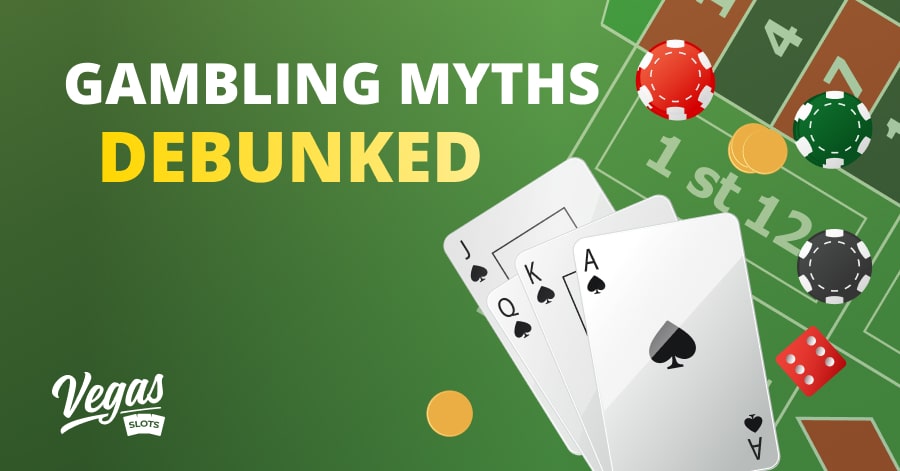Dispelling the Dice: Debunking 10 Common Gambling Myths

Gambling is a popular pastime enjoyed by millions around the world, both online and at land-based venues. However, myths and misconceptions still abound when it comes to certain aspects of gambling.
By debunking some of these common myths, we hope to paint a more accurate picture of the realities behind gambling for a more responsible and enjoyable experience.
#1. Casinos Pump Oxygen to Keep Players Awake
You may have heard claims that casinos secretly pump oxygen onto the gaming floors to keep players energized and gambling for longer. However, this is just a myth – there are several good reasons why casinos don’t actually do this.
Firstly, deliberately increasing oxygen levels would be extremely dangerous from a fire safety perspective, making the venue more flammable. No business wants to burn itself to the ground! In many jurisdictions, tampering with a building’s air supply is also illegal.
Casinos aim to provide a comfortable environment for players, but legally and safely within normal oxygen parameters. While the ambiance and excitement may energize you, it’s not due to extra oxygen flowing through the vents.

#2. Casino Games Are Rigged
A common suspicion among players is that casino games are deliberately rigged against them to guarantee that the house always wins. This is easy to understand, given how profits flow back to the casinos, but it is simply not true.
While the odds are indeed designed to provide the house with an inherent mathematical edge over time, the games themselves operate on random principles that offer fair chances of winning.
Slot machines with spinning reels have now largely been replaced by electronic gaming machines with random number generators (RNGs) that ensure fair game outcomes.
Table games are also carefully regulated and audited to guarantee proper randomness within accepted statistical norms favoring the house edge.
So, while the casinos hold an advantage to ensure profitability, the games themselves are not fixed or rigged against players.
You always have a decent random chance of winning, which maintains the entertainment value along with the profit incentive driving the industry.

#3. Card Counting is Illegal
You may see dramatic fictional depictions of players getting arrested for the notorious practice of “card counting” at Blackjack tables. However, while frowned upon by casinos, card counting itself is not illegal.
It involves skillfully tracking the dealt cards to estimate the probabilities of which cards remain playable in the shoe, allowing strategic bet adjustments favoring the player.
Casinos understandably don’t like this practice and will eject players caught counting or even ban them from returning. But there are no legal consequences per se.
The illegality only comes in when players utilize external devices or work with accomplices, which constitutes outright cheating and fraud.
But simply mentally counting cards through memory techniques is just skillful strategic play. So don’t let fictional portrayals confuse reality – card counting itself is not illegal and carries no legal repercussions.

#4. Gambling isn’t Addictive
Many people assume that only hard drugs or alcohol can be truly addictive while viewing gambling as harmless entertainment.
However, modern research clearly shows that gambling carries addiction potential through the same brain pathways and mechanisms as other addictions.
When winning a bet, dopamine and other neurochemicals produce excitement, achievement rushes, and a solid drive to repeat those rewards through further gambling.
Over time, this causes diminishing returns, tolerance, withdrawal symptoms, and ever-riskier behavior to chase that euphoric feeling of winning.
Gamblers need to acknowledge this addiction potential. By sticking to prudent limits on time and money spent gambling, the pitfalls of overindulgence and addiction vulnerability can be avoided while still enjoying gambling responsibly.

#5. Hot and Cold Slot Machines
A common myth among slot players is that machines get “hot” and “cold” – meaning some get primed to payout, while others have dry runs. They then hunt these fabled hot slots while avoiding cold machines.
However, this is categorically false. Slots function on random number generators (RNGs) producing entirely random outcomes each spin.
No patterns exist showing certain periods of hot versus cold cycles for any given machine. Any perception of this is just confirmation bias and coincidence from an inherently random system.
Some lucky players may hit bonus rounds or jackpots consecutively across a few spins, while other machines may not pay out for hundreds of spins. Neither indicates hot or cold cycles – it is purely the nature of randomness that slot machines produce.

#6. A Player is Due for a win
The psychological tendency known as the “Gambler’s Fallacy” leads players to think that if results have deviated from the statistical norms for a while, they must soon correct back towards those norms – making players “due” for that correction.
For example, if a roulette wheel hasn’t hit red for a long streak of spins, many gamblers believe red simply must be due soon to balance the randomness.
Of course, statistically speaking, each individual spin carries the exact same odds completely independent from previous results. So, no number or color is ever actually “due” based on what came before.
This myth applies across all games – if you’ve had a bad run of luck, don’t feel that turnaround luck must arrive soon. It might, but it also might not. Results don’t self-correct based on past deviations. So avoid emotions around being due for wins, and stick to rational metrics.

#7. Dealers Can Rig the Games
Some gamblers firmly believe that casino dealers actively rig games to harm winning players through sleight-of-hand tricks or other manipulation of the gameplay equipment. However, this myth doesn’t stand up to logic or scrutiny.
Independent regulators carefully monitor casino operations, including dealer behavior, to ensure fair play for customers. Dealers have no motive to illegally affect game outcomes since their income derives largely from player tips – unhappy losing players tip less.
The overhead required to train dealers in manipulation skills without getting caught is simply unrealistic compared to the statistical house edge legally built into the games already reliably generating profits.
So rest assured, dealers want you to have a fun time and tip well! They have no hidden agenda to make you lose through underhanded means.

#8. Casino Games are Pure Luck
While it’s true that casino standbys like slot machines and roulette are games of pure statistical luck, skilled gambling also exists. Poker, in particular, requires considerable strategic calculations around odds, bluffing, and capitalizing on opponent weaknesses.
Blackjack also allows players to exercise skill around decision-making on drawing cards based on strategic charts of the best mathematical move for each hand versus the dealer’s visible card.
Counting cards further tilts the odds in skilled players’ favor. So avoid blanket statements around all gambling being 100% luck-based. Players willing to learn and implement strategic frameworks can gain mini edges through skill development alongside the unavoidable luck factor.

#9. Online Casinos Don’t Pay Out
Thanks to misleading claims from disgruntled players, a myth has emerged that online casinos actively avoid paying out player winnings.
This might be true with unregulated offshore operators, but licensed sites adhering to strict regulations have reliable payout systems proven fair by third-party testing.
Confusing bonus terms like wagering requirements often fuel accusations of missing payouts. Players mistakenly believe winning while an active bonus should let them instantly withdraw their wins.
In reality, most bonuses carry a “play through” requirement, meaning you must wager the bonus value (usually 30-50x) before cashing out or withdrawing.
Read all bonus terms, play only at regulated online casinos, and you should have no issues receiving your withdrawal requests. Never accuse a site of withholding funds until verifying you have met all prior wagering requirements.

#10. Online Gambling is Illegal
Many players mistakenly assume all forms of online gambling exist in a shady gray area of illegality. In reality, regulated online casinos operating legally with proper licensing are abundantly commonplace worldwide.
The legal status does vary significantly across different countries and states, but players can easily find safely regulated options accepting them in most regions. Europe in particular hosts many established online gambling jurisdictions like Malta, UK, Isle of Man, and Gibraltar.
While offshore unlicensed casinos should be avoided, hundreds of properly vetted sites adhere to strict consumer protections, game randomness testing, and financial accountability through government-approved licensing bodies.
Using these, players can enjoy online gambling confidently within a validated legal framework mirroring land-based oversight.

Conclusion
While more myths certainly still float around the gambling world, hopefully, this article has shed light on some of the most frequent ones needing reality checks. Always apply critical thinking, scrutiny of sources, and objective evidence before believing claims of dubious gambling theories.
With a realistic perspective of how games, odds, luck vs. skill, regulations, and more truly operate, players can better navigate gambling responsibly and derive maximum entertainment value from activities they enjoy. Separating fact from fiction is the first step, so consider this your starting guide to dispelling the dice!
Author

